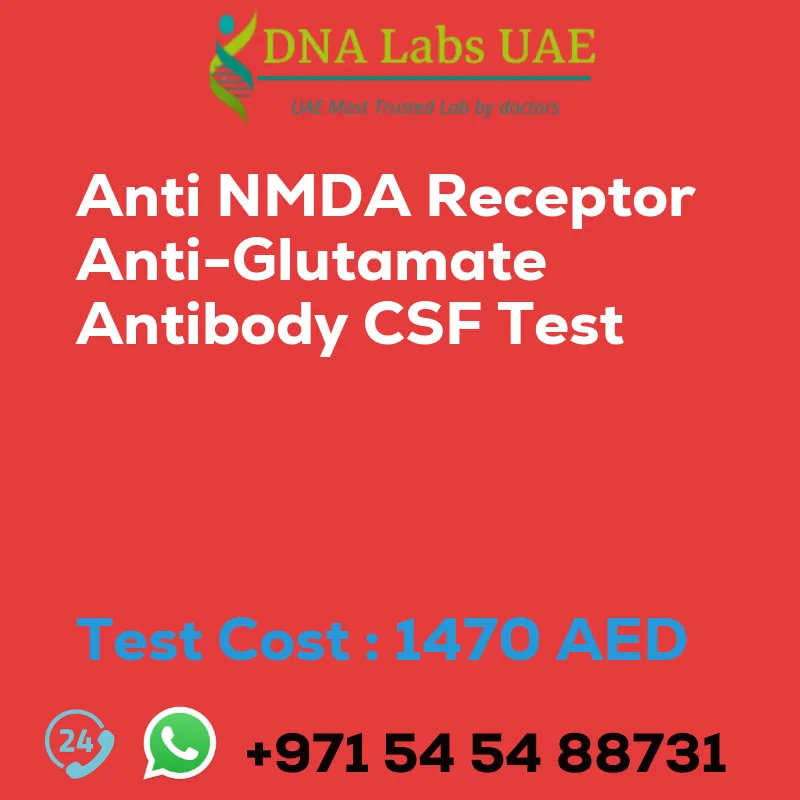ANTI NMDA RECEPTOR ANTI-GLUTAMATE ANTIBODY CSF Test
Test Name: ANTI NMDA RECEPTOR ANTI-GLUTAMATE ANTIBODY CSF Test
Components: Cell based assay, IFA
Price: 1470.0 AED
Sample Condition: 1 mL (0.5 mL min) CSF in a sterile screw capped container. Ship refrigerated or frozen.
Report Delivery: SampleTue / Fri by 9 am; Report Same day
Method: Cell based assay, IFA
Test type: Disorders of Nervous System
Doctor: Neurologist
Test Department: IMMUNOPATHOLOGY
Pre Test Information
Test Details:
The anti-NMDA receptor/anti-glutamate antibody CSF test is a diagnostic test used to detect the presence of antibodies against the NMDA receptor or glutamate in the cerebrospinal fluid (CSF). The NMDA receptor is a type of receptor found in the brain that plays a crucial role in the regulation of synaptic plasticity and memory formation. However, in certain conditions, such as autoimmune encephalitis, antibodies can mistakenly attack and target the NMDA receptor, leading to neurological symptoms.
The test involves collecting a sample of CSF through a lumbar puncture, which is a procedure where a needle is inserted into the lower back to withdraw a small amount of CSF. The CSF sample is then sent to a laboratory for analysis. In the laboratory, the CSF sample is tested for the presence of antibodies against the NMDA receptor or glutamate using various techniques, such as enzyme-linked immunosorbent assay (ELISA) or immunofluorescence.
If the test is positive, it indicates that there are antibodies present in the CSF that are targeting the NMDA receptor or glutamate. The anti-NMDA receptor/anti-glutamate antibody CSF test is primarily used in the diagnosis of autoimmune encephalitis, a condition characterized by inflammation of the brain due to the presence of autoantibodies. This test helps differentiate autoimmune encephalitis from other neurological conditions with similar symptoms.
It is important to note that the test results should be interpreted in conjunction with the patient’s clinical symptoms and other diagnostic tests to make an accurate diagnosis. Treatment for autoimmune encephalitis typically involves immunosuppressive therapy to reduce the autoimmune response and manage symptoms.
| Test Name | ANTI NMDA RECEPTOR ANTI-GLUTAMATE ANTIBODY CSF Test |
|---|---|
| Components | |
| Price | 1470.0 AED |
| Sample Condition | 1 mL (0.5 mL min) CSF in a sterile screw capped container. Ship refrigerated or frozen. |
| Report Delivery | SampleTue / Fri by 9 am; Report Same day |
| Method | Cell based assay, IFA |
| Test type | Disorders of Nervous System |
| Doctor | Neurologist |
| Test Department: | IMMUNOPATHOLOGY |
| Pre Test Information | |
| Test Details |
The anti-NMDA receptor/anti-glutamate antibody CSF test is a diagnostic test used to detect the presence of antibodies against the NMDA receptor or glutamate in the cerebrospinal fluid (CSF). The NMDA receptor is a type of receptor found in the brain that plays a crucial role in the regulation of synaptic plasticity and memory formation. However, in certain conditions, such as autoimmune encephalitis, antibodies can mistakenly attack and target the NMDA receptor, leading to neurological symptoms. The test involves collecting a sample of CSF through a lumbar puncture, which is a procedure where a needle is inserted into the lower back to withdraw a small amount of CSF. The CSF sample is then sent to a laboratory for analysis. In the laboratory, the CSF sample is tested for the presence of antibodies against the NMDA receptor or glutamate using various techniques, such as enzyme-linked immunosorbent assay (ELISA) or immunofluorescence. If the test is positive, it indicates that there are antibodies present in the CSF that are targeting the NMDA receptor or glutamate. The anti-NMDA receptor/anti-glutamate antibody CSF test is primarily used in the diagnosis of autoimmune encephalitis, a condition characterized by inflammation of the brain due to the presence of autoantibodies. This test helps differentiate autoimmune encephalitis from other neurological conditions with similar symptoms. It is important to note that the test results should be interpreted in conjunction with the patient’s clinical symptoms and other diagnostic tests to make an accurate diagnosis. Treatment for autoimmune encephalitis typically involves immunosuppressive therapy to reduce the autoimmune response and manage symptoms. |








